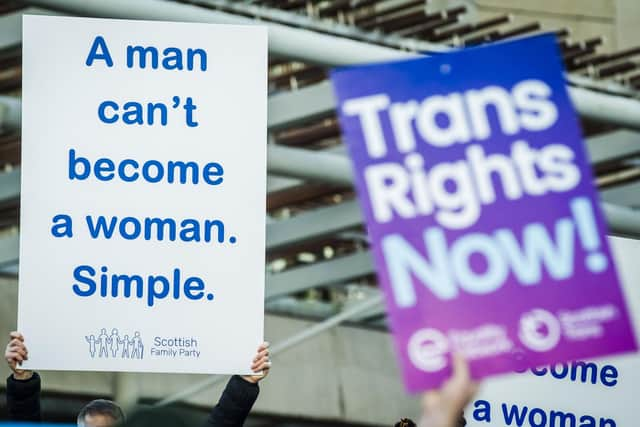Gender court battle: Scottish Government goes to court over gender reforms as SNP's Ash Regan says case is 'fundamentally flawed'
One of the biggest constitutional battles since devolution officially goes to court this week. The battle? Scotland’s gender reform proposals.
Set your mind back to December last year, when MSPs voted on the Scottish Government’s Gender Recognition Reform Bill. The legislation aimed to make it easier for a trans person to legally change their gender.
Advertisement
Hide AdAdvertisement
Hide AdThe Bill reduced the amount of time a trans person would need to live in their acquired gender from two years to just three months, lowered the age at which someone could apply for a gender recognition certificate from 18 to 16, and removed the requirement for a medical diagnosis of gender dysphoria.


It was vehemently opposed by the Scottish Conservatives and others, who said they had major concerns about how this would impact on women’s single-sex spaces. The Bill also wasn’t unanimously backed within the SNP.
SNP MP Joanna Cherry spoke against the proposals at a rally outside the Scottish Parliament, and Ash Regan, who went on to challenge Humza Yousaf to become First Minister, resigned from the Government so she could vote against the reforms. Eight other backbenchers did not vote in favour of the reforms.
Kate Forbes, who also ran to be first minister, did not vote on this matter as she was on maternity leave at the time.
During the leadership campaign, she admitted she would not have supported the reforms, and presumably would have forfeited the job she held as finance secretary at the time as well over the legislation..


Despite this, the reforms were passed by a majority of MSPs by 86 votes to 39, leading to a round of applause and a standing ovation from some campaigners in Holyrood’s public gallery – something that is not normally allowed.
It also led to furious shouts from those who opposed the reforms, and bizarre scenes when one woman started to quack at MSPs like a duck, and another lifted her skirt to “flash” the sitting parliamentarians.
However, less than a month later in January 2023, Scottish secretary Alistair Jack announced he would be blocking the Bill from gaining royal assent. The Conservative MP issued what is called a section 35 order – something that had not been done since devolution in 1999.
Advertisement
Hide AdAdvertisement
Hide AdSection 35 of the Scotland Act 1998 gives the Scottish secretary the power to veto legislation enacted by the Scottish Parliament, even if it deals with a devolved matter. If this order is used, it bans Holyrood’s presiding officer from submitting a bill to King Charles III for royal assent.


The UK Government claims the Bill would have an adverse effect on the operation of the Equality Act 2010, which is reserved to Westminster and covers the whole of the UK.
Mr Jack said the UK Government was concerned the Bill would impact on single-sex associations or clubs, the public sector equality duty and equal pay, and lead to an increase in fraudulent applications for a gender recognition certificate.
In April, social justice secretary Shirley-Anne Somerville confirmed the Scottish Government would lodge a petition for a judicial review of Mr Jack’s decision to use a section 35 order. So here we are – with the Scottish Government effectively taking the UK Government to court.
It’s not a decision that has gone down well with everyone. Ms Regan says the court case is “a pivotal moment”, and has warned her own Government’s case is “fundamentally flawed”.
She said: “Should the court rule against the Scottish Government, as is likely, an appeal would not only be costly, but irresponsible. The Scottish taxpayer should not bear the financial burden for a case that was ill-conceived from the start.
“While there are many issues for which Westminster should be held accountable, this Bill’s failure could have been averted had the cross-party consensus in the Scottish Parliament exercised appropriate due diligence.”
The court challenge is also not universally popular with the wider public. A poll run by Savanta for The Scotsman in February found 53 per cent were against the legal action.
That’s not going to stop the Scottish Government, however.
Advertisement
Hide AdAdvertisement
Hide AdMr Yousaf has said doing nothing would “signal that the UK Government can veto any legislation they disagree with at a whim”, and said legal action was the “only means of defending our Parliament’s democracy from the Westminster veto”.
Perhaps it is understandable as Mr Jack has stepped in on a number of other Scottish policies in recent months, such as the proposals to introduce a deposit return scheme.
It may be interesting to note Mr Yousaf won’t actually be in Scotland while this court case happens. He is in New York to attend Climate Week 2023, and is not due to fly back until Thursday.
The case will now be heard by the Outer House of the Court of Session in Edinburgh from Tuesday.
This part of the proceedings is expected to take three days. Lady Haldane, who ruled in 2022 the definition of sex was “not limited to biological or birth sex”, will preside over the case.
A first hearing, which was a procedural hearing to make sure all the parties involved were ready to proceed, took place on August 16.
The three-day hearing will be live streamed by the Scottish Courts and Tribunals Service, meaning anyone who wants to see exactly what happens in the courtroom can.
Comments
Want to join the conversation? Please or to comment on this article.